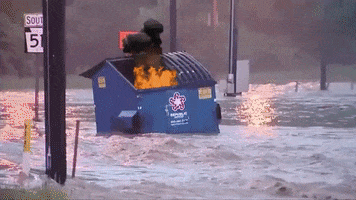I look forward to low-intelligence people shooting each other over places to plug their cars in because they planned poorly.
Man... that news cycle is going to be juicy.
Electricity? Juice? Eh... Eh?

I am bolting home.
I look forward to low-intelligence people shooting each other over places to plug their cars in because they planned poorly.
Man... that news cycle is going to be juicy.

but what ride it must've been though..He used to be my hero. Of course he used to have all of his toes too. I guess he lost his mind somewhere along the way as well.
I'll tip my hat to you there sir, I went to URI for their bachelors in Ocean Engineering which.... I guess is their "multidisciplinary" do anything in the ocean or coastal zone kinda deal. The electrical side in the coursework for whatever reason just never was my favorite.I'm an electrical engineer and I work in distribution planning and protection for a utility - I am dealing with some of these problems in real-time.
But again... true efficiency studies have to balance savings over the serviceable life of the upgrade vs what would be getting replaced, then account for startup efforts.We only have a limited number of resources on this planet and I think they should be used as efficiently as possible.
Agreed. And it's only getting worse. One benefit to a simpler more streamlined ICE is its rebuildability and updatability. But electronics don't lend themselves to easily being updated. Cite to taking an IBM 8088/286/386/etc and updating it to a modern computer. Compare to the hated sbc to ls swap.There is no need for 17 million new cars and trucks to be sold in the US every single year.
I agree that its nice to, even if it's really superficially touching on issues, have discussion.. if nothing else my intent was to flag for other people types of things they might not have ever thought about... to open the eyes that there's more going on here than the idea electricity is clean, fuel burning bad, go ev!The scope of this conversation is getting too big now - my main point is that EVs are here whether we like it or not and I think they are a welcomed change. I always think it is great to see the perspective of others so I'm glad we're able to debate things like this. You brought up a lot of good points, ck80
It's almost like we're adults.It's almost like we could be civilized for once

Speak for yourself. 😜It's almost like we're adults.
Yeah, I help build a portion of those vehicles, so that's kinda my bread and butter, and will have to respectfully disagree. NEED, maybe, maybe not, but I would recommend buying a new Toyota ASAP.There is no need for 17 million new cars and trucks to be sold in the US every single year.
Nice to have an unbiased review, from someone who actually knows something.I'm an electrical engineer and I work in distribution planning and protection for a utility
I hope there's lots of insulation. But imagine if there was a problem with the cooling system and the floor caught fire. I assume there's a shutdown circuit, but what if that failed?The whole floor is a battery.
I found 2 pictures I had of the batteries. One in the car, one out. I imagine if they removed it to do the swap it would adversely affect the handling of the car.I hope there's lots of insulation. But imagine if there was a problem with the cooling system and the floor caught fire. I assume there's a shutdown circuit, but what if that failed?
We need to get back to talking about putting turbos on LS motors; when I read liberal politics and 'Save the World' sustainability stuff on a hot rod forum, it makes me want to puke...I agree with you that in the grand scheme, this is not a battle of EVs vs ICE - sustainability reaches much further than that. Cities should be more pedestrian, bicycle, and rail friendly. Our current generation, transmission, and distribution infrastructure is not fit for the imminent electrical load increase. You're also correct saying that manufacturing batteries has harsh side effects.
I'm an electrical engineer and I work in distribution planning and protection for a utility - I am dealing with some of these problems in real-time. I am going to disagree with your statement that the manufacturing and support of EVs is more environmentally unfriendly than the ICE counterparts.
Look at this from an efficiency perspective (I'm going to generalize for the sake of keeping it simple) - Liquid fuel (mainly gas and diesel) is extracted, processed, and distributed on a huge scale all across the world to be sold at gas stations. The average ICE vehicle is about 30% efficient in converting the chemical potential energy stored in liquid fuel into usable kinetic energy; most is lost as heat waste. I am completely ignoring the additional inefficiencies that you must consider in distributing the gasoline to the end user.
It is more efficient to use fossil fuels (mainly natural gas) for large scale generation. These plants can have efficiencies in the 60%+ range, up to something like 80%. This is achieved through Combined Heat and Power, in which waste heat is collected and used for boiling water, driving a steam turbine, providing on-site heat, etc. Losses through transmission and distribution lines are typically minimal (<10%), and EVs themselves are usually in the 80%+ range, up to around 95%.
I know that natural gas is not the same as gasoline, the point is that there are better uses of fossil fuels. We only have a limited number of resources on this planet and I think they should be used as efficiently as possible.
Concerning the upfront pollution with battery production (mainly lithium, nickel and cobalt), that is surely an area that needs improvement. Like I said in a previous post though, alternate battery chemistries are currently being researched and developed, which I think is great news as far as sustainability is concerned. Another option is hydrogen fuel cells, which are basically EVs with hydrogen fuel. That eliminates the need for a huge battery, however they have their own set of challenges (such as sourcing the materials needed for the fuel cells - look up PEM fuel cells for more info on that), but are great solution as well.
Recycling batteries is also an area that needs improvement - the recycling process results in the loss of a lot of material, both valuable and invaluable. I had actually heard at one point that in certain scenarios, it is cheaper for some EV manufacturers to not even bother recycling old batteries because too little is gained vs the amount of energy put into the recycling process. They would rather stockpile the old batteries until they can be recycled more efficiently. I'm not sure if this is still the case.
Like I said, I'm not saying junk all ICE vehicles and go straight to EVs. ICEs have their place in the world right now, and we'd be in a lot better of a place if people didn't have the need to always buy new things instead of just sticking with what they've got.
There is no need for 17 million new cars and trucks to be sold in the US every single year. "Growth for the sake of
GBodyForum is a participant in the Amazon Services LLC Associates Program, an affiliate advertising program designed to provide a means for sites to earn advertising fees by advertising and linking to amazon.com. Amazon, the Amazon logo, AmazonSupply, and the AmazonSupply logo are trademarks of Amazon.com, Inc. or its affiliates.

